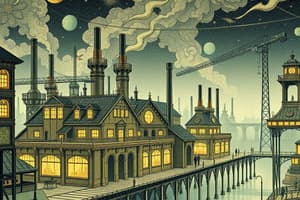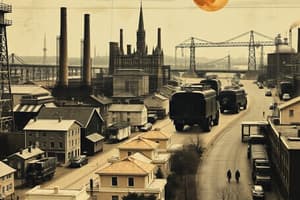Podcast
Questions and Answers
The industrial revolution was a long __________________ process that completely changed the way ___________________ were produced.
The industrial revolution was a long __________________ process that completely changed the way ___________________ were produced.
slow, goods
_____________________ replaced hand tools, and _____________________ power replaced human and animal power.
_____________________ replaced hand tools, and _____________________ power replaced human and animal power.
machines, steam
The economy shifted away from _____________________________ and went towards _____________________.
The economy shifted away from _____________________________ and went towards _____________________.
farming, industry or manufacturing
What are people with money to invest in businesses to try to make a profit called?
What are people with money to invest in businesses to try to make a profit called?
What system brought workers, machines, and raw materials all to the same place where workers put in hours for wages?
What system brought workers, machines, and raw materials all to the same place where workers put in hours for wages?
What term describes having or feeling loyalty to one's state, region, or area?
What term describes having or feeling loyalty to one's state, region, or area?
What are identical machine-made parts that can be easily assembled and make production cheaper called?
What are identical machine-made parts that can be easily assembled and make production cheaper called?
What canal connected the Hudson River with Lake Erie?
What canal connected the Hudson River with Lake Erie?
What Supreme Court case involved Dartmouth College?
What Supreme Court case involved Dartmouth College?
What Supreme Court case did Maryland try to tax the second Bank of the U.S.?
What Supreme Court case did Maryland try to tax the second Bank of the U.S.?
What Supreme Court case upheld the power of the federal government to regulate commerce?
What Supreme Court case upheld the power of the federal government to regulate commerce?
Who was a southern leader concerned with farming, protecting slavery, and a weak federal government?
Who was a southern leader concerned with farming, protecting slavery, and a weak federal government?
Who was the 5th President of the U.S. during the 'Era of Good Feelings'?
Who was the 5th President of the U.S. during the 'Era of Good Feelings'?
Who was the capitalist that had the idea to clean, spin, and weave cotton into cloth under one roof?
Who was the capitalist that had the idea to clean, spin, and weave cotton into cloth under one roof?
Who was the leader that spoke for the West and concerned with infrastructure improvements?
Who was the leader that spoke for the West and concerned with infrastructure improvements?
Who helped start the Industrial Revolution in America by bringing plans from Britain?
Who helped start the Industrial Revolution in America by bringing plans from Britain?
Who spoke for the North and was against slavery?
Who spoke for the North and was against slavery?
Who designed the cotton gin and developed interchangeable parts?
Who designed the cotton gin and developed interchangeable parts?
Some settlers took the route to the Great _____________ _________ across Pennsylvania.
Some settlers took the route to the Great _____________ _________ across Pennsylvania.
What country lost Florida to America?
What country lost Florida to America?
________________ _________________ gave the Seminole Indians a share of their crops for providing shelter.
________________ _________________ gave the Seminole Indians a share of their crops for providing shelter.
President Monroe gave a speech that included his __________________ policy statement.
President Monroe gave a speech that included his __________________ policy statement.
This document stated that the United States would ________________ any attempt to build new colonies in America.
This document stated that the United States would ________________ any attempt to build new colonies in America.
Creek and ____________________ Indians from Florida raided settlements in Georgia.
Creek and ____________________ Indians from Florida raided settlements in Georgia.
What project did New York's Governor Dewitt Clinton persuade lawmakers to provide money for?
What project did New York's Governor Dewitt Clinton persuade lawmakers to provide money for?
What were the four hazards that occurred with these new cities: ________________ and ___________________ streets turned into mud holes when it rained.
What were the four hazards that occurred with these new cities: ________________ and ___________________ streets turned into mud holes when it rained.
In the new factory system, workers earned _________________ or ______________ wages.
In the new factory system, workers earned _________________ or ______________ wages.
Early factories, called mills, got their power from:
Early factories, called mills, got their power from:
Young women and children were hired in early mills mostly because:
Young women and children were hired in early mills mostly because:
During the Industrial Revolution, cities were usually:
During the Industrial Revolution, cities were usually:
James Hargreaves of Britain designed a machine that spun several threads at once:
James Hargreaves of Britain designed a machine that spun several threads at once:
The factory system changed the way things were produced by:
The factory system changed the way things were produced by:
The invention of the steamboat was important because:
The invention of the steamboat was important because:
When the charter for the first bank of the United States ran out:
When the charter for the first bank of the United States ran out:
A protective tariff helps businesses by:
A protective tariff helps businesses by:
Flashcards are hidden until you start studying
Study Notes
Industrial Revolution
- A gradual process that fundamentally transformed the production of goods.
- Introduction of machines that replaced manual tools; steam power replaced human and animal labor.
- Shift in economy from agriculture-focused to industrial and manufacturing-based.
Economic and Social Changes
- Capitalists: Individuals with financial means to invest in businesses for profit.
- Factory system: Centralized labor setup where workers operated machines and raw materials were consolidated.
- Sectionalism: Loyalty to one's local state or region over the entire nation.
Technological Innovations
- Interchangeable parts: Standardized, identical components made assembly cheaper and efficient.
- The Erie Canal: Crucial waterway linking the Hudson River and Lake Erie, lowering travel and shipping costs.
Landmark Legal Cases
- Dartmouth College vs. Woodward: New Hampshire legislature's attempt to convert a college into a state university.
- McCullough vs. Maryland: Maryland's taxation efforts against the second Bank of the U.S. challenged federal authority.
- Gibbons vs. Ogden: Affirmed federal government's authority to regulate interstate commerce amid New York's steamboat law enforcement.
Key Political Figures and Policies
- John C. Calhoun: Southern leader advocating for agriculture, low taxes, and maintaining the strength of the state government.
- James Monroe: 5th U.S. President known for the "Era of Good Feelings" and formulating Monroe Doctrine on foreign policy.
- Francis C. Lowell: Innovator behind integrated textile manufacturing; established a worker community around factories.
- E. Henry Clay: Proponent of infrastructure improvement to facilitate western expansion and trade.
Industrial Leaders and Innovators
- Samuel Slater: Mechanic who brought British textile mill designs to the U.S., initiating American industrialization.
- Daniel Webster: Northern leader focusing on protecting industry, opposing slavery, and advocating for a proactive government role.
- Eli Whitney: Inventor of the cotton gin and pioneer of interchangeable parts manufacturing.
Migration and Settlement
- Key routes for settlers towards the Great Lakes, including the Cumberland Gap and transportation via the Ohio River.
- Spain ceded Florida to the United States, impacting geopolitical boundaries in North America.
Social Structure and Labor
- The introduction of a labor force in factories led to poor living conditions: muddy streets, lack of sewers, garbage in the streets, and spread of disease.
- Factory workers typically earned daily or weekly wages, working long hours (12 hours a day, 6 days a week).
- Early mills primarily relied on water power for machinery operations.
Labor Force and Gender Roles
- Young women and children accepted in factories due to lower wage requirements compared to men.
- Cities emerged around factories, leading to increased urbanization and economic reliance on industrial jobs.
Impact of New Technologies
- Machines like the spinning jenny revolutionized textile production, increasing efficiency.
- Protective tariffs were implemented to shield American businesses by making foreign products more expensive.
Summary of Key Points
- The Industrial Revolution marked a turning point in American history, with significant shifts in economics, labor, legal entities, and social structure.
- Technological advancements and key political figures played a critical role in shaping the industrial landscape.
- Landmark legal cases established important precedents regarding federal authority and economic regulation.
Studying That Suits You
Use AI to generate personalized quizzes and flashcards to suit your learning preferences.



